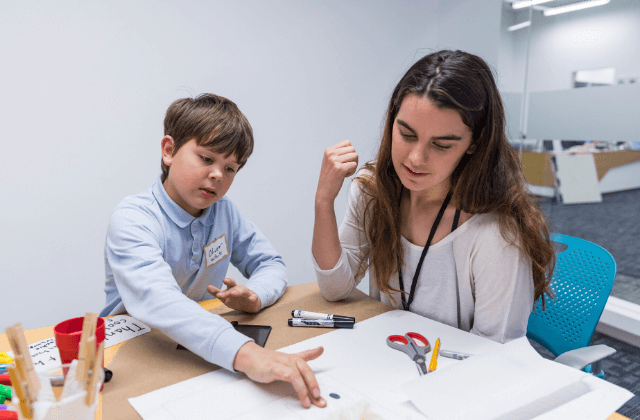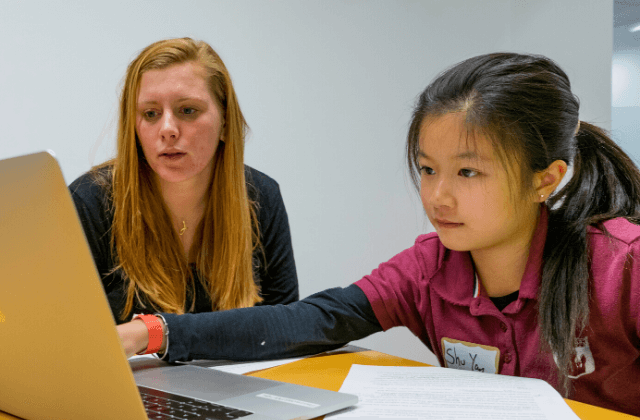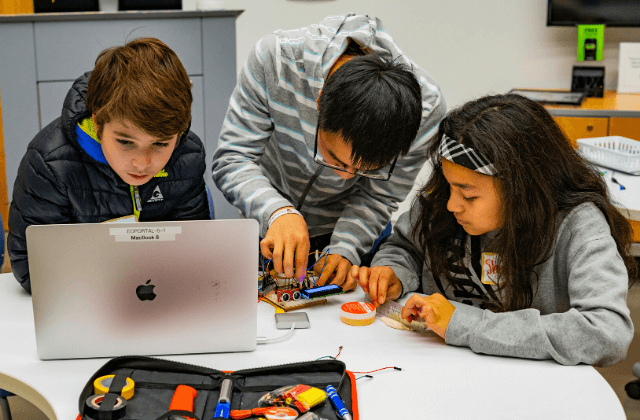News
Grace Eysenbach, S.B. ’20, an electrical engineering concentrator, works with mentee Oliver White, 11, a fifth grade student at Saint Columbkille Partnership School. (Photo by Joshua Chiang/SEAS Communications)
A crime had been committed. Some unknown villain had eaten all of Grace Eysenbach’s cupcakes.
She and her partner were on the case. They carefully examined and classified fingerprints on the cupcake box and used chromatography to determine which colored marker was used to write a note left at the scene. Their scientific know-how paid off and the frosting-fingered perpetrator was quickly apprehended.
The duo’s detective work was a lesson Eysenbach designed to teach her fifth-grade mentee about colors, solutions, molecules, and scientific research methods. Eysenbach, S.B. ’20, an electrical engineering concentrator at the Harvard John A. Paulson School of Engineering and Applied Sciences, serves as a mentor for three students at the Harvard Ed Portal in Allston.
“It’s the happiest three hours of my week—getting to walk across the river and spend time in the mind of a kid, thinking about how education can be exciting,” she said. “Oftentimes, as college students, it is easy to just view education as a series of to-dos. But just to remember how much we all loved school when we were younger, and then trying to recreate that experience for our mentees, is so much fun.”
Eysenbach is one of 28 Harvard undergrads who work one-on-one with elementary, middle, and high school students. With guidance from Ed Portal staff and interns from the Graduate School of Education, they design unique curricula that match the interests and goals of mentees.
Armed with a brief description of their mentees’ areas of interest, mentor utilize the plethora of Ed Portal resources, which run the gamut from a well-equipped science room to arts and craft supplies, to come up with lessons.
“One of the challenges I face is keeping a student engaged while also challenging them,” said Julia Henry, A.B. ’20, an environmental science and engineering concentrator. “It can be difficult to strike the right chord when I’m not really familiar with what a sixth grader’s background is. But it is so helpful to work with other mentors and the resources the Ed Portal provides to keep a mentee engaged and excited.”
Julia Henry, A.B. ’20, an environmental science and engineering concentrator, and mentee Shu Yan Huang, 9, a fourth grade student at the Gardner Pilot Academy, collaborate on a project. (Photo by Jiayin Lu/SEAS Communications)
One of Henry’s favorite lessons is a model Earth experiment she developed to teach her mentee about climate change. Together, they painted three different model earths, one covered in ice, one with ice at the poles, and one with no ice at all, to demonstrate how melting ice caps create a positive feedback loop that alters the planet’s surface temperature.
The project helped fulfill the mentee’s semester goals, which involve learning more about science, while enabling Henry to draw on her environmental engineering expertise. While there are many challenges to building a nine-week academic plan, it is important to remember that mentoring is about process goals, and just getting a student excited about science is well worth the effort, she said.
Moriah Lim first became excited about science in grade school, thanks to the mentors who supported his robotics club. As a way to pay it forward and strengthen his engineering skills, Lim S.B. ’22, a mechanical engineering concentrator, now co-teaches a robotics class for six students.
It can be challenging to ensure he and his co-teacher are supporting each member of the group while working through material that can be heavy for students with little computer science experience.
But the “ah-ha” moments make it worth it. He recalls a difficult lesson where students struggled to understand the concept of loops as they programmed a robot to move in a square. After a lot of coaching, they successfully used loops to dramatically shorten the programming process and beamed as they watched the robot move.
Moriah Lim S.B. ’22, a mechanical engineering concentrator, helps mentees Shuvana Pradham, an eighth grade student at the Prospect Hill Academy, and Artyom Ermolaev, a sixth grade student at the Sandy Hill School, make some tweaks to their circuit board. (Photo by Jiayin Lu/SEAS Communications)
“That was a really cool moment,” Lim recalled. “It reminded me why our course is important. It teaches them different engineering and programming skills, but also logical thinking skills that can be applied to many different areas, in their other classes or even in their future careers. Getting them interested and excited about robotics and electronics is really cool.”
But what happens if the mentees aren’t interested in a mentor’s area of expertise?
Caroline Ko, A.B. ’20, an environmental science and engineering concentrator, has been working far out of her comfort zone on arts and crafts projects and creative writing assignments. She ties the material to STEM when she can, but has surprised herself by how much she has learned through the liberal arts lessons.
It can be a steep challenge to create engaging and memorable lessons for a student, especially when they are also mired in homework and extra-curricular activities. It emphasizes the struggles K-12 teachers face every day in the classroom, she said.
One of Ko’s most rewarding moments came during a creative writing activity. She and her mentee free-wrote in silence for 10 minutes, journaling about something they knew would never happen to them. Ko wrote about flying a spaceship to the moon, while her mentee wrote about piloting a submarine deep into the ocean.
“We were both surprised by how well that assignment went for each of us. In both of our curriculums, in the classes we take, there isn’t really time to do an activity like that, where you just take time to free write, share, and reflect on it,” she said. “It was so interesting to dissect our different pieces and talk about our trains of thought while we were writing. That experience emphasized to me that it can be worthwhile to do something completely new, or something you wouldn’t expect to do.
Those pleasant surprises are the greatest rewards of mentoring, Eysenbach said.
As she walks back across the bridge to Cambridge each Wednesday evening, her mind buzzes with the lessons they worked through that afternoon. No matter how many half-finished p-sets are waiting back in her dorm, those bright spots put a spring in her step.
“Mentoring really does remind me why I started loving engineering in the first place,” she said. “In classes, a lot of times they are more theory based and your eyes can start to glaze over while you’re hearing a lecture. But when you see your mentee finally understand how a closed circuit lights up a light bulb, that is just incredible. It inspires me to try and find that joy in my own engineering classes.”
Topics: Academics, Allston Campus, Computer Science, Electrical Engineering, K-12
Cutting-edge science delivered direct to your inbox.
Join the Harvard SEAS mailing list.
Press Contact
Adam Zewe | 617-496-5878 | azewe@seas.harvard.edu





